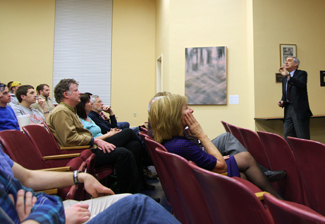Professor Joel Mokyr, Northwestern University, presented an accessible idea for what caused the start of the Industrial Revolution in Europe. He delivered the annual Benjamin A. Rogge lecture.
 The Rogge Lecture serves as one of numerous opportunities for Wabash students and faculty to hear presentations from scholars from around the world. “I went to the Rogge Lecture with Dr. Mokyr because I have a strong interest in economic history,” Adam Alexander ’16 said. “After taking an economic history class with Dr. Burnette last semester, I have been looking for opportunities to learn more about the historical side of economics. In fact, next fall I will be studying economic history at the University of Oxford. So it was a really great opportunity to have one of the world's most renowned economic historians come to Wabash.”
The Rogge Lecture serves as one of numerous opportunities for Wabash students and faculty to hear presentations from scholars from around the world. “I went to the Rogge Lecture with Dr. Mokyr because I have a strong interest in economic history,” Adam Alexander ’16 said. “After taking an economic history class with Dr. Burnette last semester, I have been looking for opportunities to learn more about the historical side of economics. In fact, next fall I will be studying economic history at the University of Oxford. So it was a really great opportunity to have one of the world's most renowned economic historians come to Wabash.”
Mokyr said a market for ideas is what brought about the revolution, and the Republic of Letters which developed in Europe was specifically responsible for it. Mokyr has spent time researching the reasons why society is wealthier today than hundreds of years ago. “Why are we 20 times richer than our great great grandfathers?” Mokyr asked. “For most of history, the vast bulk of people were poor. They were living on the verge of subsistence, they were barely getting by. Now we all, or almost all people in the industrialized world are living at levels that are in no way on the verge of subsistence.”
The answer could be institutions such as law and order, good property licenses, no rent seeking, good conflict resolution, openness and inclusiveness, and efficiency among others. These institutions can play a factor in making a country wealthier. Mokyr explained that two countries with similar resources and locations, such as North and South Korea, can have vastly different economic success because of the institutions in each.
However, these institutions can only help a country grow to a certain extent. This is because of the law of diminishing and marginal returns. “A country like Ukraine, for instance, nowadays could really grow a great deal if it improved its institutions because its institutions are really lousy,” Mokyr said. “But if you look at a country like Norway which has really good institutions, can you make Norway richer by improving institutions? Well you probably could, but it’s hard because its institutions are already really good. Technology isn’t like that. So far it doesn’t run into diminishing returns.”
The aforementioned institutions are universal but can only help an economy to a certain extent. So what caused a momentous event like the Industrial Revolution and why did it happen in Europe and not elsewhere?
The answer is the transnational and virtual Republic of Letters. It spanned Europe and was almost entirely spread in the form or letters. No schools or buildings housed this republic.
There is a market for ideas like there is a market for many other products. A person who comes up with a new idea tries to sell it, or get other people to go along with that idea. Problems occur because ideas are public goods. Commons problems happen with public goods. Essentially there is little motivation to create new ideas.
 The Republic of Letters created a community which fostered a growth of ideas. Much like those in academic communities today, the scientists, philosophers, mathematicians, and other thinkers shared their ideas with one another through letters and other publications in order to create reputations for themselves. A good reputation could lead to patronage from a wealthy count or duke.
The Republic of Letters created a community which fostered a growth of ideas. Much like those in academic communities today, the scientists, philosophers, mathematicians, and other thinkers shared their ideas with one another through letters and other publications in order to create reputations for themselves. A good reputation could lead to patronage from a wealthy count or duke.
The key was that this community was open to all, it tested new ideas, was egalitarian, and ideas were shared within it. People shifted their thinking into a belief that society progresses as time goes on and that the ancients could be challenged. Mokyr believes that the Republic of Letters still exists in academic communities and with advances like the Internet.
Students and faculty alike appreciated the way Mokyr tied his ideas together. “I think the concept made a lot of sense, and he did a great job parsing out all of the details,” David Newhart ’15 said. “He's incredibly smart and was able to back up the theory of his Institution with a large amount of facts from history. I saw a few professors smile about that.”
Mokyr has served as president of the Economic History Association and editor of the Journal of Economic History and has written numerous papers and books on economic history including The Lever of Riches and The Enlightened Economy.
“Learning directly from world experts is a privilege usually reserved for graduate students,” Alexander said. “At Wabash though, it happens so often that it almost seems to feel routine. It's one of the amazing things about this College that makes it so unique from other schools.”